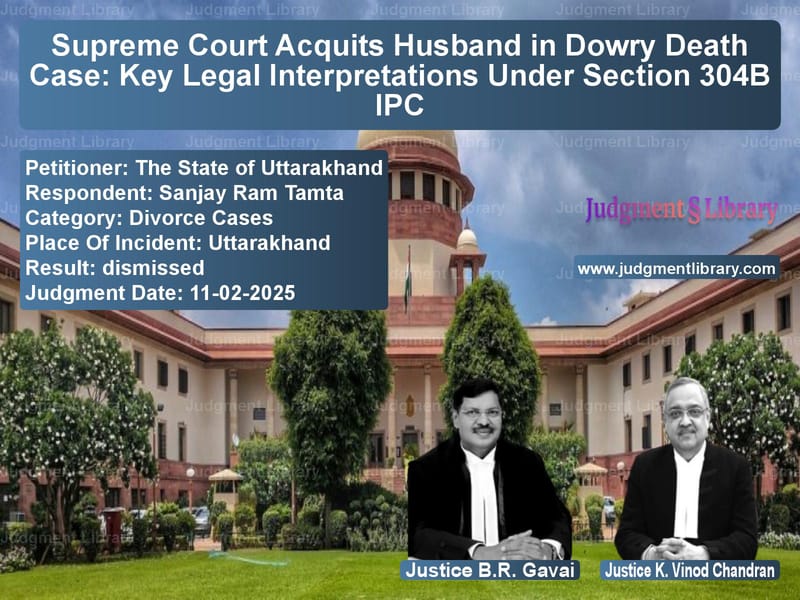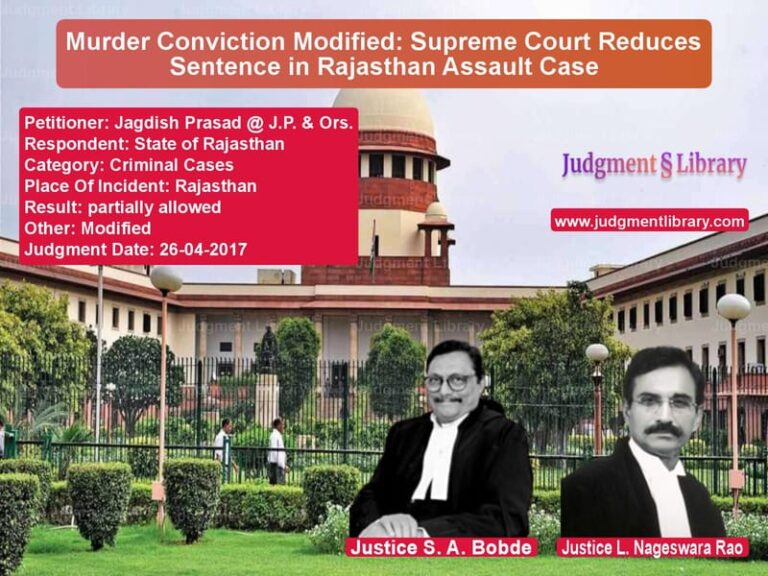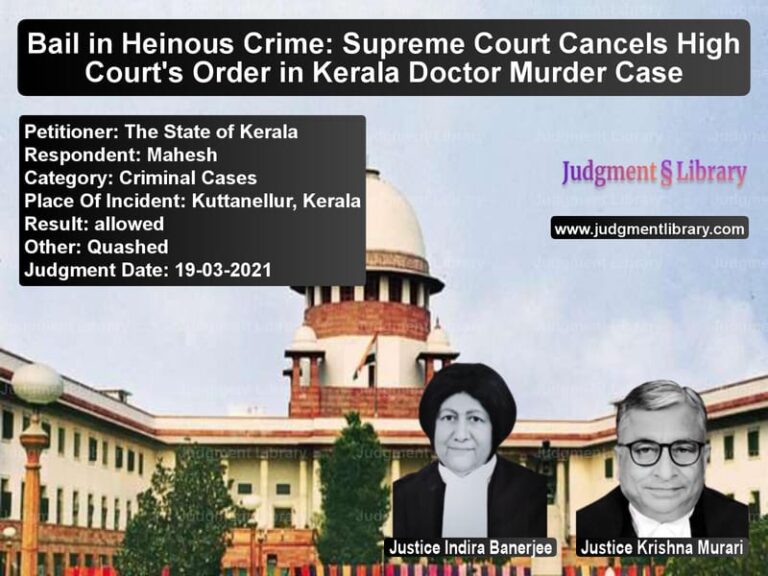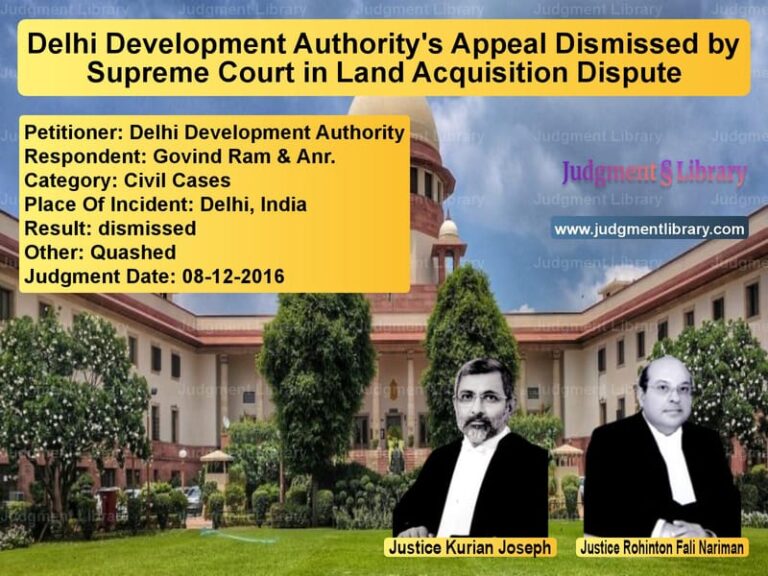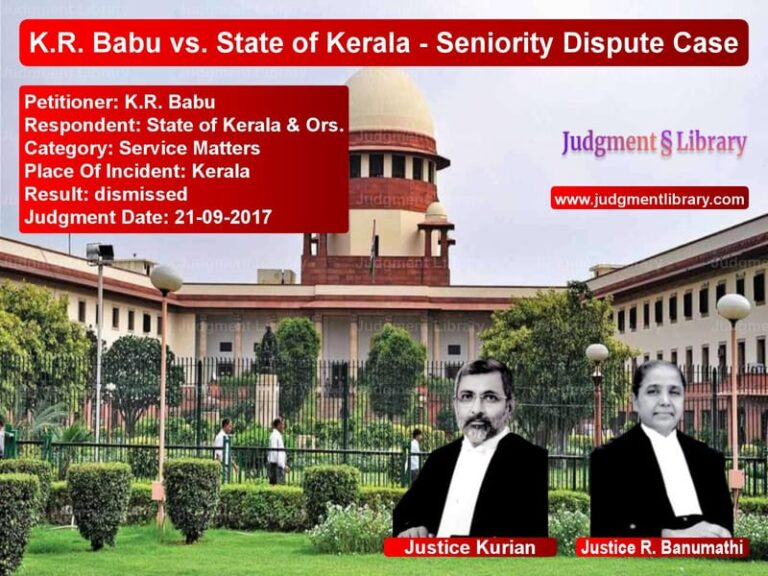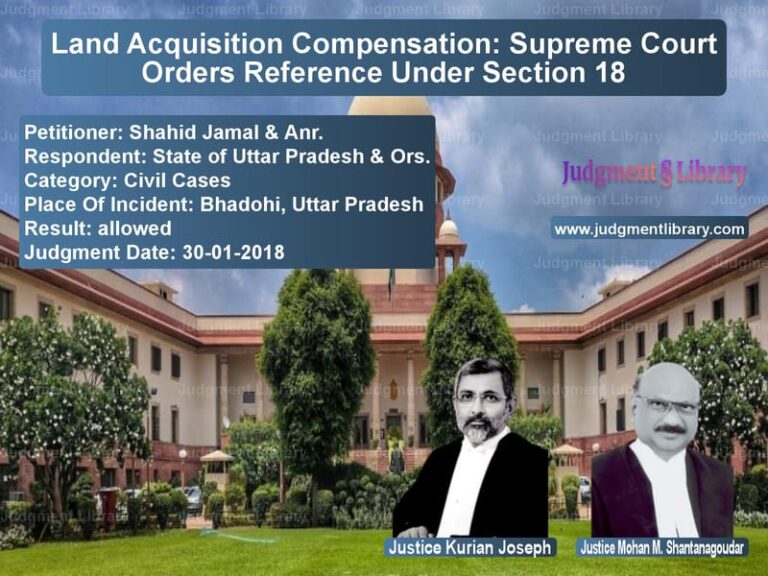Supreme Court Acquits Husband in Dowry Death Case: Key Legal Interpretations Under Section 304B IPC
The tragic loss of a young bride within six months of her marriage led to criminal proceedings under Section 304B of the Indian Penal Code (IPC), dealing with dowry deaths. The prosecution alleged that the husband, Sanjay Ram Tamta, had subjected his wife to dowry harassment, leading to her unnatural death by hanging. The case moved from the Trial Court, which convicted the accused, to the High Court, which overturned the conviction, and finally reached the Supreme Court, which upheld the acquittal.
This judgment brings to light the crucial interpretation of legal provisions surrounding dowry deaths and the presumption under Section 113B of the Indian Evidence Act. The Supreme Court’s ruling highlights the importance of substantial proof, credibility of witness testimonies, and the role of appellate courts in reviewing lower court decisions.
Background of the Case
On the fateful day, the deceased was found hanging in her matrimonial home by her father and brother. A First Information Report (FIR) was lodged, leading to the arrest of her husband. The deceased’s family alleged that she had been harassed for dowry, which ultimately led to her committing suicide. The prosecution relied on circumstantial evidence, including a history of marital discord and financial demands, to establish the case against the accused.
Trial Court’s Findings
The Trial Court convicted the husband under Section 304B IPC, primarily relying on:
- Scratches found on the deceased’s body, which the Court presumed indicated physical abuse.
- Witness testimonies alleging dowry harassment.
- The presumption under Section 113B of the Indian Evidence Act, which states that if a woman dies under unnatural circumstances within seven years of marriage and had been subjected to dowry harassment, the burden of proof shifts to the accused.
Based on these findings, the Trial Court sentenced the accused to seven years of rigorous imprisonment.
High Court’s Reversal of Conviction
Upon appeal, the High Court examined the evidence and found inconsistencies in the prosecution’s claims. Key reasons for the acquittal included:
- Contradictions in witness statements regarding dowry demands.
- Failure of the prosecution to establish a clear link between alleged harassment and the deceased’s suicide.
- The landlord’s testimony suggesting marital discord unrelated to dowry.
- Insufficient evidence to prove that the scratches on the deceased’s body were caused by the accused.
The High Court concluded that the prosecution failed to prove guilt beyond a reasonable doubt and acquitted the accused.
Arguments Before the Supreme Court
The case was then taken to the Supreme Court, where both sides presented their arguments.
Petitioner’s Arguments (State of Uttarakhand)
- The deceased was subjected to mental and physical harassment for dowry, leading to her suicide.
- The presumption under Section 113B of the Evidence Act should apply, shifting the burden of proof to the accused.
- The injuries on the deceased’s body suggested physical torture before death.
- The testimony of the father and brother should be given significant weight as they were direct witnesses to the financial demands made by the accused.
Petitioner’s counsel, Ms. Sakshi Rawat, argued:
“The very fact that the young bride was found dead within six months of marriage raises a strong presumption of dowry harassment, which the respondent has failed to rebut. The presence of injuries on the body further supports the theory of torture leading up to the tragic incident.”
Respondent’s Arguments (Sanjay Ram Tamta)
- There was no independent corroboration of dowry harassment.
- Witness statements were inconsistent and did not align with the FIR.
- The injuries on the deceased’s body were not proven to be caused by the accused.
- The presumption under Section 113B of the Evidence Act should not apply due to the prosecution’s failure to establish a direct link between alleged harassment and the suicide.
Respondent’s counsel, Ms. E.R. Sumathy, argued:
“The prosecution’s case is built entirely on conjecture and uncorroborated allegations. The High Court correctly identified contradictions in witness statements and rightly acquitted the accused. There is no material evidence to sustain the conviction.”
Supreme Court’s Judgment
The Supreme Court, comprising Justices B.R. Gavai and K. Vinod Chandran, carefully examined the legal principles governing dowry deaths and the role of appellate courts in reviewing acquittals. The Court made the following observations:
- The burden of proof does not automatically shift to the accused unless the prosecution first establishes essential elements under Section 304B IPC.
- Contradictions in witness testimonies weaken the prosecution’s case.
- Presumptions under Section 113B of the Evidence Act require a proximate connection between dowry demands and the unnatural death.
- Acquittals should only be overturned if the findings of the lower court are perverse or completely unsupported by evidence.
Verbal Observations by the Court
Justice K. Vinod Chandran remarked:
“The essential ingredient of a demand of dowry being absent under Section 304B of the I.P.C., we cannot find the suicidal death; though, categorized as an unnatural one, as one akin to murder inviting a punishment under Section 304B of the I.P.C.”
Justice B.R. Gavai, citing precedent, observed:
“Interference with the finding of acquittal recorded by the learned trial judge would be warranted by the High Court only if the judgment of acquittal suffers from patent perversity.”
Based on these findings, the Supreme Court upheld the High Court’s acquittal of the accused.
Conclusion
The Supreme Court’s ruling reinforces the necessity for clear and convincing evidence in dowry death cases. While the law provides a presumption against the accused in such cases, it must be backed by substantive proof. This judgment sets an important precedent for the application of Section 304B IPC and Section 113B of the Indian Evidence Act, ensuring that legal safeguards are appropriately balanced.
The appeal was dismissed, and the acquittal of the accused was confirmed.
Petitioner Name: The State of Uttarakhand.Respondent Name: Sanjay Ram Tamta.Judgment By: Justice B.R. Gavai, Justice K. Vinod Chandran.Place Of Incident: Uttarakhand.Judgment Date: 11-02-2025.
Don’t miss out on the full details! Download the complete judgment in PDF format below and gain valuable insights instantly!
Download Judgment: the-state-of-uttarak-vs-sanjay-ram-tamta-supreme-court-of-india-judgment-dated-11-02-2025.pdf
Directly Download Judgment: Directly download this Judgment
See all petitions in Dowry Cases
See all petitions in Domestic Violence
See all petitions in Judgment by B R Gavai
See all petitions in Judgment by K. Vinod Chandran
See all petitions in dismissed
See all petitions in supreme court of India judgments February 2025
See all petitions in 2025 judgments
See all posts in Divorce Cases Category
See all allowed petitions in Divorce Cases Category
See all Dismissed petitions in Divorce Cases Category
See all partially allowed petitions in Divorce Cases Category

